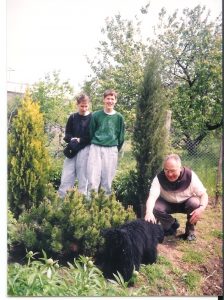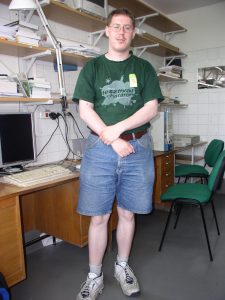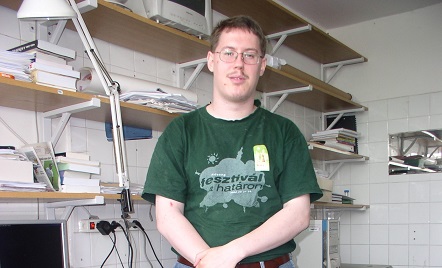Grace in Christ in Hungary – Matthew Cserhati
I was born in the United States, and upon the behest of my Catholic father, I attended a Catholic private elementary school in Maryland. Later, after I had moved there with my twin brother, I attended a Franciscan high school in the city of Szentendre, Hungary. My uncle, a Franciscan priest, was working in Switzerland.
I would describe myself as a person who used to be a typical Catholic, although my Catholic faith had been tainted by modern thoughts. However, I tried to be a good Catholic before I was seventeen years of age. My Catholic faith meant keeping the traditions and orders of the Catholic church. I read one or two books about Catholicism. When I was a bit older, I read Dante’s Divine Comedy. My basic train of thought was to be a good person and to work as many good deeds as possible in order to enter the kingdom of heaven. I thought that I would be so good that it would be a breeze to get in.
A Deep Impression

Below is his uncle, a Franciscan priest
I was really fascinated by the Catholic faith—the pomp of it all. I even read a few parts of the Bible. At that time, though Catholic, I believed that the Bible was the ultimate source of truth. Still, I believed that the priests and the pope in Rome were so clever that they would always be able to infallibly interpret it in the right way. I did not know that the Catholic Bible, which I read, had some parts added to it, for example, as when compared to the true canon of the Old Testament! In fact, there were things in my life in conflict with what the Bible said. For example, I thought that I would be good enough to “allow myself a few little sins now and then,” because my “good deeds’ economy” allowed it. I thought that, even in the worst case, I would be able to scratch myself out a place in lower purgatory and then make my way back to heaven.
Little I knew, that in my spiritual condition, I would have to stand before God’s perfect standard on Judgment Day. “As it is written, ‘There is none righteous, no, not one: There is none that understandeth, there is none that seeketh after God. They are all gone out of the way, they are together become unprofitable; there is none that doeth good, no, not one.’”1
The Old Nature at Work
There were times when I did quite horrendous things, such as beating the cat, being mean to the neighbor’s kids, or sometimes fighting with my own brother, which made our mother quite sad. In Catholic school, we read the story of the prodigal son. He was the son who went and sinned his life away in decadence, but later came back to his father in repentance. We often overlook this parable.2 It is written that the older son had a hardened heart towards his younger brother and was far from God: After the younger brother returns, we read, “And he [a servant] said unto him, ‘Thy brother is come; and thy father hath killed the fatted calf, because he hath received him safe and sound.’ And he was angry, and would not go in.”3 Not unlike the older son, I was simply trying to bargain with God and give Him my good deeds instead of searching out His will for my life. The following verses from John tell something about this. The Bible speaks of the Samaritan woman who “ritually” worshipped on the mountain, but still did not know God. “But the hour cometh, and now is, when the true worshippers shall worship the Father in spirit and in truth: for the Father seeketh such to worship him. God is a Spirit: and they that worship him must worship him in spirit and in truth.”4
Besides these sins, which I had previously overlooked, I was filled with a false sense of smugness and superiority towards those who were not Catholic or Christian, and who, therefore, were sinners. I would feel sort of a just anger at sinful people who seemed to have it good. Little did I know that God desires to have all men saved and to come to the knowledge of the truth.5 Many of my Catholic friends are in this situation. Because of this, I believe many Catholics fall prey to hypocrisy.
Seeing Things the Way They Were
As a Catholic, I would have been outraged if any negative critique or slander would befall the Roman church or the pope—which itself is quite a source of judgmentalism—even my wishing people into hell. What I did not understand at that time was why one of my teachers said that Good Friday was a good day for humanity; a day one should be happy for Jesus’ death. I did not understand why we should have been happy for the death of the Son of God, since we had to earn our way into heaven anyway. While reading Dante’s works, another thing that I did not understand was why pagans were also included in the “nine circles”6 of heaven.
A major shift happened in my life when I was in high school, and, by this time, I was even more prepared to commit my life to Catholicism. As I saw it, the high school I attended was an institution meant to catholicize the students; a plan to spread Catholicism all over the country. Before entering high school, I learned by rote memory answers to questions regarding the Catholic faith with the assistance of a Father Theodosius. My baptism was celebrated at the Church of Pasarét in the capital city of Budapest. At the beginning of high school, I pretty much revered our priestly teachers. I thought that they were good people who would lovingly help my brother and me because we had just recently come from America and were still having difficulties with the Hungarian language. The problem was that I underestimated the sinfulness of human nature. I would describe the four years in high school as one of the worst periods in my life. Because we came from another country, all the other students and even some of the teachers took advantage of us. Since my brother and I were sensitive, their abuse was very hard on us. It was no type of ordinary abuse, however. Kicking, punching, and insulting us was quite common. So much so, that the torment was so great for my brother that he had to go to a sanitarium for three months. During this dark period, I realized that I had to help my brother if I wanted to say that I was a good person. However, the sad fact was that at this time my understanding of human nature had to crumble, because I did not help him. It was very much like “For they loved the praise of men more than the praise of God.”7 This was a heavy burden, which I had to carry for two years. Yes, as everybody else, I was a sinful person. Indeed, I needed forgiveness.
Discovering the Real Jesus
God had not abandoned me; one day I went home after the history teacher had given me a failing grade on a test because of who I was. At home, I found a Bible lying on the table. I opened it and read, “Better is a dinner of herbs where love is, than a stalled ox and hatred therewith.”8 This was to later help me in not trying to find favor with the people at high school who loathed me, but to try to find the will of God. After high school, another great turning point occurred in my life. It was at this time that I went to a Christian camp to the north of Szentendre. Real Christians were spending their summer there. I sensed that these people were quite different than those people I had met at high school. They talked to Jesus Christ in a very personal way, as though they knew him like they knew any other person. They trusted in Jesus, instead of trusting in something by which (if they would repeat prayers by rote) they could reach some desired result. The Bible talks about this: “And by their prayer for you, which long after you for the exceeding grace of God in you.”9 Their prayers differed from my Catholic prayers in that they were based on Scripture and not just some repeated memorized prayers. They emptied their hearts out to Jesus Christ in a very personal way. This was strange for me as a Catholic, because even though at times I felt God close to me, I still felt awkward when coming before Him. They told me about how one can get to know Jesus as Lord, Savior, and Redeemer. I was happy that by the end of the camp I was able to go to my brother for forgiveness.
My Conversion
Later on, as I attended Christian church services and Bible studies, I understood how one becomes a Christian. This was the grace of God, as I see it. I was convicted of sin; I realized my lost condition before the All Holy God, and I was ready, by God’s grace, to believe on the Lord Christ Jesus. I realized that I was spiritually dead in trespasses and sins and therefore without any hope of salvation. My receiving from Christ, and in Christ, is all summed up in one word—grace. “And of his fulness have all we received, and grace for grace.”10
Now I can proclaim that I am a child of God who has received forgiveness, once and for all time, totally free from the bondage of sin. I can now stand in front of Him, thankfully not to my own merit, but to the merit of the true and perfect Jesus Christ. Soon afterwards, prayer took on a new meaning when I asked for, and gave thanks for, personal things. I am thankful that now I can personally rely on God and the Holy Spirit.
Now I know that I have eternal life, not because of what I did—not counting on my own dubious righteousness, but on the righteousness of Jesus Christ, through whom we have everything God wishes to give as a gift, which does not have to be earned through toil—but received by faith alone.
Answered Prayers
A verse from the Bible, which I had often heard after becoming a Christian, is “But seek ye first the kingdom of God, and his righteousness; and all these things shall be added unto you.”11 As a concrete example, I could tell you how I was able to get what should have been a doctoral position at the Biological Research Center in Szeged after not being able to find a position anywhere around Budapest. Many places were filled up, and I was studying to be a bioinformatician,12 which is quite a new science within biology, meaning even less places to secure employment. Yet, I was able to get a position at Szeged through the help of Christian friends. All my thanks for this goes to the God of grace. As I can see now, God has led me on a wonderful path to a deeper knowledge of Him from the Bible.
Sharing the True Gospel

W hat is most important to me was that after I was born again I felt free to do good deeds. God had set me free to do them, but not to placate his anger. I am free in His love to do them, and I know that I am able to do them; I do not have to fear punishment if I do not have them. For the love and mercy of God, I felt free to hate sin and turn away from it. Compared to my prior life as a Catholic, I found it surprising that I was able to speak with people about God. I was even able to talk to a few of my biology teachers at the university about my belief in a literal six-day creation and the importance of the Gospel. I can also say with Paul as he states in his letter to the Romans: “I beseech you therefore, brethren, by the mercies of God, that ye present your bodies a living sacrifice, holy, acceptable unto God, which is your reasonable service. And be not conformed to this world: but be ye transformed by the renewing of your mind, that ye may prove what is that good, and acceptable, and perfect, will of God.”13
The message of the Gospel, of all that the Lord Christ did or suffered, is that the Lord Jesus Christ is ready to receive all sinners that come to Him. Know that He is able to make us right with the Father; He is ready and willing to receive us. The testimony that He has given us concerning His goodness and love cannot be called into question and none dare question or deny His power. It is rightly taken for granted that Christ is able to touch us with His grace although we may have lived many years of our lives in rites and rituals that proved to be empty. Believe He can, and He will! Christ Jesus is able to save all those, and only those, who come to God by Him. All things in heaven and earth are committed unto Him. All power is His, and He will use it for the assured salvation of all that come to Him in faith. Believe on Him alone. You will be secure, accepted in the Beloved, that you may behold His Glory, knowing that such will be for all eternity. “Therefore if any man be in Christ, he is a new creature: old things are passed away; behold, all things are become new.”14
In His name, Matthew Cserhati
If you wish to contact me, please email me at: csmatyi1@gmail.com
1 Romans 3:10-12
2 Luke 15:11-32
3 Luke 15:27, 28
4 John 4:23, 24
5 1 Timothy 2:3-5
6 The orbits of the nine planets of the solar system
7 John 12:43
8 Proverbs 15:17
9 2 Corinthians 9:14
10 John 1:16
11 Matthew 6:33
12 Bioinformatics or computational biology is the use of techniques from applied mathematics, informatics, statistics, and computer science to solve biological problems.
13 Romans 12:1, 2
14 2 Corinthians 5:17


